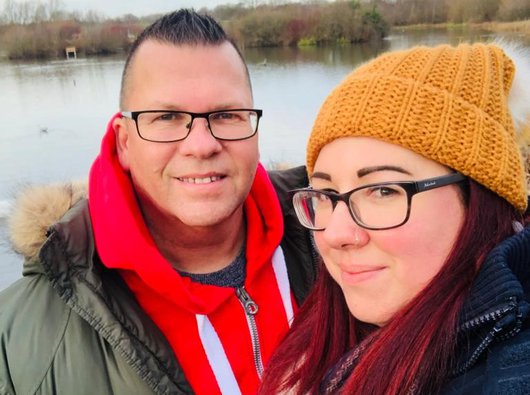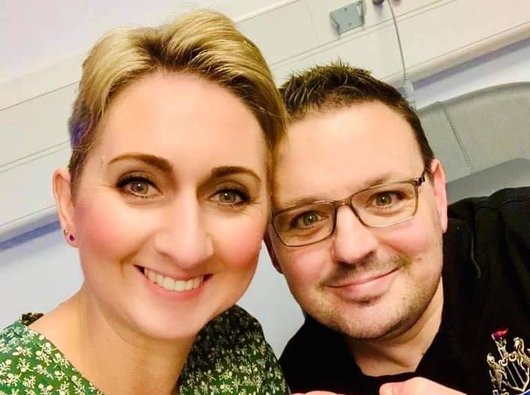Protecting someone from infection
On this page:
What you need to know:
- Know what to look out for – the warning signs of infection.
- Get advice if you think someone with blood cancer has an infection.
- Act quickly – infection can develop very fast and turn into sepsis.
What to do if you think someone with blood cancer has an infection
Blood cancer and blood cancer treatment weaken the body’s immune system and it can take time to recover. This means people with blood cancer are at higher risk of getting an infection, sometimes even when they’re in remission.
For people with blood cancer, infections can develop very quickly. They can also lead to sepsis. Sepsis is a life-threatening condition, so it’s best to spot and treat an infection early, before sepsis develops.
It’s therefore very important to know what the symptoms of infection are, and what to do if you think someone with blood cancer has an infection:
If someone is currently having blood cancer treatment
They should have an emergency number to call (a local chemotherapy hotline or cancer treatment helpline) if they are having anti-cancer treatment.
- Call the emergency contact number and follow the advice you are given.
- If you don’t have access to the number or can’t get through, drive them to the nearest accident and emergency department (A&E) if it is safe to do so. Or call 999 for an ambulance.
If someone is not currently having blood cancer treatment
- Call their GP or hospital team.
- If you can’t speak to the GP or hospital team, call 111.
- Follow the advice you are given.
- If you are told to take them to A&E, drive them to the nearest A&E department or call 999.
Read our information about what to say in A&E, and how to plan for a sudden visit.
Symptoms of infection
Because there are many types of infection, there are also many possible symptoms of infection. Here’s a list of some more common ones – any one of these could be a reason to get medical advice:
- feeling hot or cold (a temperature that’s higher or lower than normal)
- sore throat
- cough producing green mucus
- frequent watery poos (diarrhoea)
- being sick (vomiting)
- feeling dizzy or faint
- headache or stiff neck
- skin feeling red, hot or swollen
- burning or stinging when weeing, or passing a small amount
- pain, redness or discharge (fluid) around the site of a central line
- pain, itching or unusual discharge from the penis or vagina
- new pain anywhere in the body
- generally not feeling well.
You may simply feel that something isn’t quite right. For example, your loved one may seem quieter or more sleepy than usual.
Trust your instincts. You know best whether someone you are close to is unwell.
Always get medical help if you are in doubt. And act quickly, because infection can lead to sepsis, a very serious medical condition.
We have made a free pocket-sized infection alert card for people with blood cancer, their family and friends. It includes essential information like the main symptoms of infection and what to do if you are worried.
Your loved one is entitled to care
Don’t feel that you’re wasting people’s time. You’re just as entitled to be in A&E as someone with a broken leg. Just because it's not always something you can see doesn't mean that you're not entitled to care.
Kayleigh, married to Mart, diagnosed with myeloma

Who’s at risk from infection?
The risk to people with blood cancer is highest if:
- they are neutropenic – they have a low level of white blood cells called neutrophils.
- they are having any treatment for blood cancer, including chemotherapy, targeted therapies, steroids, radiotherapy, stem cell transplant or CAR-T therapy.
- they are taking immunosuppressant drugs, such as steroids or ciclosporin, for another condition. (These drugs stop the immune system attacking healthy cells but also affect how it fights infection.)
- they have had their spleen removed or have problems with their spleen, an organ which is part of your immune system.
- they have a central line fitted, making a small wound where the line breaks the skin.
- they have a sore mouth or mouth ulcers (mucositis) as a side effect of treatment.
- they have broken skin because of a rash or itching, a side effect of some blood cancers or treatment.
Even people who are not having blood cancer treatment or suffering side effects can be at risk from infection. It’s important to get all the information you can about someone’s personal level of risk.
For carers: coping with the responsibility
People with blood cancer can start to feel ill very quickly when they get an infection. They may not be well enough to make decisions. Understandably, they may not be keen on the idea of going to A&E. So it often falls to the people closest to them to encourage them to get help.
This can feel like a big responsibility. It’s something that can make you feel like more of a carer, even if you don’t really see yourself that way.
If this feels overwhelming or scary, call us on 0808 2080 888 to talk things through. You can also find other carers in a similar situation on our online community forum. They may be able to give you some tips and reassurance.
There are things you can do to help yourself feel a bit more in control.
If you are the next of kin, get as much information as you can about your loved one’s immune system. Ask their consultant or specialist nurse, how is their immune system affected? Will that change? When will it change?
This will help you understand more about their level of risk. The team can also advise you about common sources of infection and how to avoid them.
If you don’t feel confident talking to the hospital team, call us – we can support you to build a relationship with medical professionals.
Pass on information about infection risk to family members and close friends. Anyone who is in regular contact with the person with blood cancer may be able to take a share of the responsibility. This is particularly important if you are not living with the person you care about.
If people in your wider circle know what the symptoms of infection are, they can ask the right questions and get medical help when it’s needed.
Share this page with them. You can also give them a copy of our Infection Alert Card. This contains the essential information they need, especially if your loved one is happy to write in personal details such as the treatment they’re having.
Keep a record of any infection symptoms you spot. Write down any symptoms your loved one describes, and anything you see yourself. Note when the symptom started, and whether it’s getting worse.
This information will be helpful for any medical staff you need to see.
Our Infection Alert Card can help you record infection symptoms.
A high or low temperature can be a sign of infection, so a digital thermometer is a useful tool to have.
Most hospital teams will recommend you get medical advice if the body temperature reaches 37.5°C or goes below 36°C. This is a good guide but remember that normal body temperature can vary from person to person and between thermometers.
Paracetamol, steroids and aspirin can mask a fever, so bear this in mind and tell medical staff if the person you are supporting is taking these medicines.
Temperature is an important sign of infection, but remember it’s not the only thing to look out for. If your loved one seems unwell to you, ask for advice.
If you speak to a medical professional and feel your concerns are not being taken seriously, stand your ground. Explain your worries clearly and firmly. It will help if you have noted symptoms or changes in behaviour and when these started.
Don’t feel you are making a fuss – you are just looking out for someone you care about. See our page about what to say in A&E for more information.
Martha’s Rule
Martha’s Rule is designed to make sure that “the concerns of the patient and those who know the patient best are listened to and acted upon.” If you take someone to hospital with a suspected infection, know that you have the right to a rapid review from a separate care team. Mention Martha’s Rule and ask for a second opinion.
You're the expert
You just learn to be really quite firm and set your own boundaries. Stand up for your understanding of what's right and what isn't. For some people, that is going to be really hard. It depends what type of person you are. But I guess you become that person. Because at one time I would never question anything a doctor told me. But now I feel I'm the expert in living with this.
Gail, married to David, diagnosed with non-Hodgkin lymphoma

For wider family, friends and neighbours: ways to help
If you know someone has blood cancer and is at risk of infection, think about what you can do to help keep them safe.
If you have any symptoms of an infection yourself, even just a sniffle, it’s best not to see them until you are better. This may be disappointing, but their health is the priority.
There may be times when you cannot see them because the risk is too great. This may be during and after certain types of treatment. It may seem hard, but remember that it is only temporary.
In the meantime, you can stay in touch by phone or video calls or messaging – whatever your family member of friends would prefer.
If you do meet in person, there are ways to lower the risk of passing on an infection (which you may not know you have). These things will be familiar from the covid pandemic:
- Consider meeting outside if the weather is good enough.
- If you meet inside, open windows to increase ventilation and stay two metres apart.
- Consider wearing a face mask. FFP3 masks offer the highest level of protection. Other types of face covering like surgical masks may help but not to the same extent.
Above all, try to be understanding. If someone says they cannot have visitors or they cannot come to a party or family gathering, respect their decision. They will be acting on medical advice and what feels safe for them.
For more information about how people can make their own judgements about risk from infection, read our information about making balanced decisions.

Talk to other people affected by blood cancer
Hear from and connect with people who understand.
